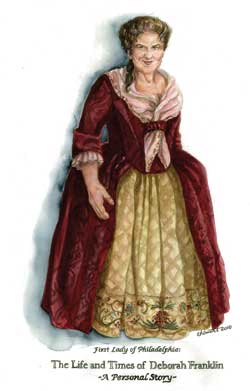 Roberta Sloan, a first-generation American whose father emigrated from Russia, has always had a love for history, particularly the history of Colonial America. Her interests in the historical beginnings of America coupled with her experience on the cusp of the women's movement in the 1970s led her to pursue the little-known story behind the life of Benhamin Franklin’s dynamic wife, Deborah Franklin.
“The more research we did, the more interested and excited I became about discovering that Deborah Franklin was, indeed, the woman behind the man — a feisty, opinionated, capable businesswoman, who was a respected citizen of Philadelphia,” said Sloan.
“I came to believe that Benjamin Franklin could not have become the famous Benjamin Franklin we recognize today without Deborah Franklin. So I was determined to tell her story.”
Temple Times talked with Sloan about her new production, First Lady of Philadelphia: The Life and Times of Deborah Franklin, which stages March 31 through April 11 at Temple’s Randall Theater.
Courtesy Marie Anne Chiment
A costume rendering depicts Benjamin Franklin’s dynamic wife, Deborah, the subject of a one-woman play written and performed by Temple Theater Chair Roberta Sloan.
What was the most interesting anecdote that you came across during your research?
Probably one that comes from the Autobiography of Benjamin Franklin. It describes when he first met Deborah. He was a runaway from an apprenticeship to his brother, a Boston printer, and supposedly, he had no money in his pocket when he arrived in Philadelphia. Hungry, with his last few pence, he bought three loaves of bread, which he carried under his arms. This is how Deborah first met him. It was a meeting that would change both their lives.
Were there any unexpected findings as you began to put the pieces of Deborah’s story together?
One really synergistic aspect of the piece that took me completely by surprise is that Professor Terry Halbert's husband Bill is a direct descendant of the Franklins. It is because of him that we have permission to use the very famous portrait of Deborah Franklin on our posters and programs. Now how incredible is that! By the way, some people have told me that Deborah Franklin and I look alike. I do think that there is a resemblance.
What was the most challenging aspect of bringing her story to life?
The most challenging aspect, I believe, is the one ahead — the actual acting of the play. One-woman shows are very challenging to learn and present. You only have yourself up there on stage to depend upon, and you want to make the play amusing, sad, interesting, entertaining and always engaging. I want to do justice to the person whose life I am portraying, Deborah Franklin. To my mind, she has a story to be told. As she says in the play, "My story has mystery and majesty like his..." I hope to be able to share that story with the audience.
How will Deborah Franklin's story appeal to a modern audience?
Some characters are universal. I believe Deborah Franklin to be one of them. Here is a woman who lived in a different time, and yet she faced some of the same challenges that women today face. Her story is the untold story of the wife of one of the most famous of all Americans.
Are there plans to stage this piece outside of Temple?
Yes, there has already been a lot of interest about staging the play elsewhere. As they say in theatrical terms, this play seems to have "legs." I am already scheduled to present it at Ursinus College in the fall. Cape May Stage and Hedgerow Theater, two professional theatrical venues, are interested in me presenting it at their theaters. Historic Philadelphia, the organization that presents all of the historical figures and storytellers in Old City every spring through fall, is very interested in the play. I think there will be a lot of added interest because the character is a Philadelphian and such a great part of the history of our city.
|

